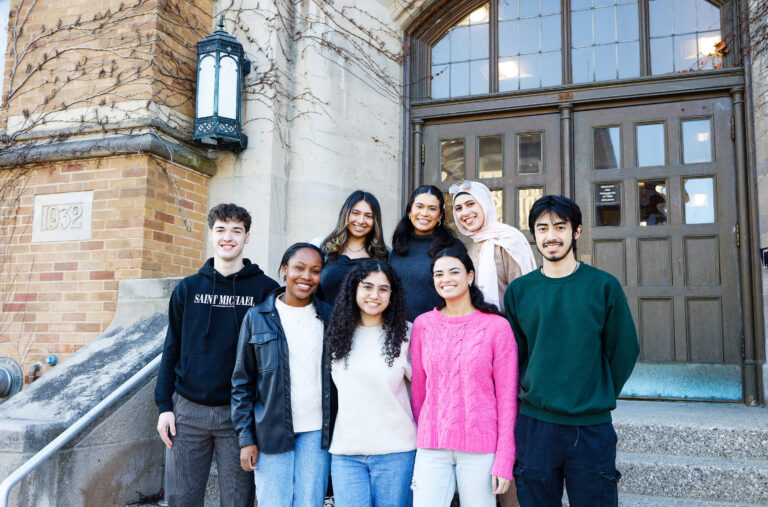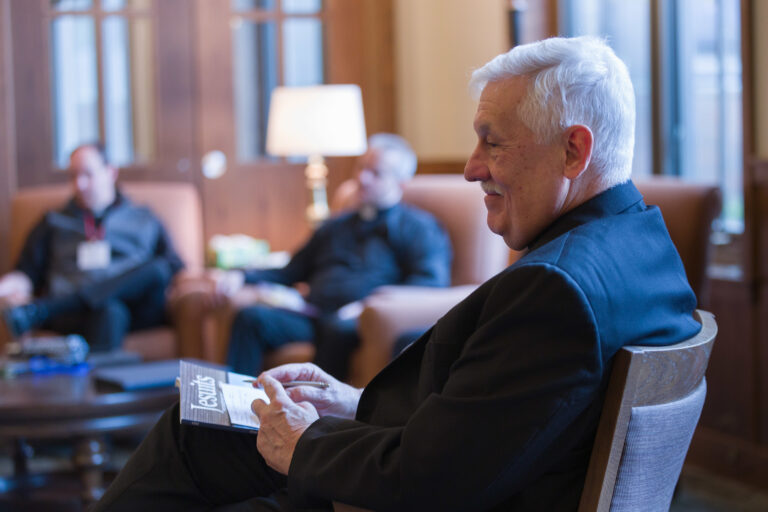By Anna Wallace, communication intern in the Office of Marketing and Communication at Marquette University
Marquette University is proud to have more diverse faculty members than ever before.
From 2016 to 2020, the percentage of faculty of color at Marquette grew from 13.4% to 16.9%, part of an initiative to increase representation and enhance the academic experience through elevating different experiences and perspectives.
In honor of Black History Month, here are just a few outstanding Black scholars at Marquette who are making major contributions in the classroom and to their respective fields:
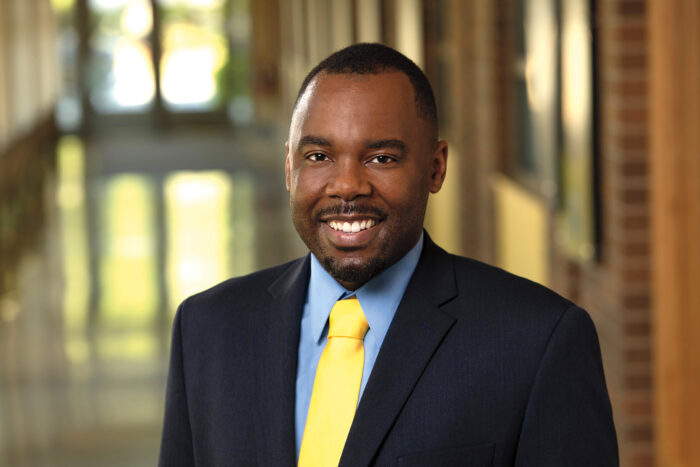
Dr. Cedric Burrows
Dr. Cedric Burrows is an associate professor of English in the Klingler College of Arts and Sciences. He teaches literature, African American rhetoric and culture, social movements, and more. Some of his more popular courses include “I Am We: Memoirs of the Black Freedom Movement and Writing,” “Literacy, Rhetorical Studies: The Rhetoric of the Black Freedom Movement,” and “The Rhetoric of Martin Luther King and Malcolm X.”
Burrows, who led the revamp of English 1001, a staple of Marquette’s Core Curriculum, also helped design Foundations in Rhetoric to incorporate more literature from diverse authors to recognize those authors’ experiences and validate the identities of traditionally underrepresented students.
Author of the book “Rhetorical Crossover: The Black Rhetorical Presence in White Culture,” Burrows is also engaged in several research projects, including one that examines how the United States constructs narratives around the civil rights movement through public memorials.
Burrows was recently honored with the 2021 National Council of Teachers of English David H. Russell Distinguished Research Award. In 2020, he received Marquette’s Excellence in Diversity and Inclusion Faculty Award, which recognizes select faculty and staff members who demonstrate exemplary leadership and manifest the ideals of diversity, equity and inclusion into practical action.
Dr. Dora Clayton-Jones
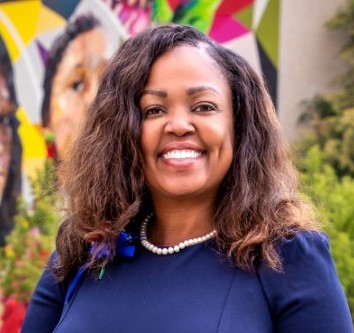 Dr. Dora Clayton-Jones is an assistant professor in Marquette’s College of Nursing and an adjunct faculty member at the Medical College of Wisconsin. She teaches courses such as Nursing in the Jesuit Tradition and Family-Centered Nursing of Children Theory.
Dr. Dora Clayton-Jones is an assistant professor in Marquette’s College of Nursing and an adjunct faculty member at the Medical College of Wisconsin. She teaches courses such as Nursing in the Jesuit Tradition and Family-Centered Nursing of Children Theory.
Clayton-Jones has dedicated her research to the self-management of chronic conditions, health disparities and equity, spirituality and health in adolescents, as well as qualitative and community based participatory research.
Currently, Clayton-Jones — who serves as the president of the International Association of Sickle Cell Nurses and Professional Associates — is the recipient of critical funding for several sickle cell research projects on which she is the principal investor. Projects include “Eliminating Sickle Cell Disparities Amount Youth: The POSSE Intervention” and “Exploring COVID-19 with Young Adults Living with Sickle Cell Disease: A Community-based Photovoice Project.
She has received numerous honors and awards throughout her career, including the Betty Irene Moore Fellowship for Nurse Leaders and Innovators, and Marquette’s Community Engaged Research Partnership Award. Clayton-Jones’ professional affiliations include the National Black Nurses Association, the American Association of Nurse Practitioners, Sigma Theta Tau International and the Health Care Transition Research Consortium.
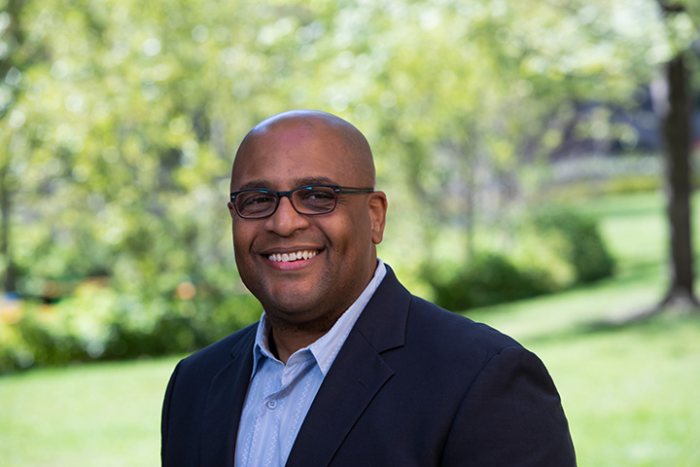
Dr. Robert S. Smith
Dr. Robert S. Smith is the Harry G. John Professor of History in the Klingler College of Arts and Sciences. He is also the director of Marquette’s Center for Urban Research, Teaching and Outreach (CURTO), an intellectual axis and key convener of programs that address issues central to affirming human rights and dignity.
Currently, Smith leads a research team to support the Education Preparedness Program, a CURTO-led initiative that will support those impacted by incarceration to succeed in higher education. In 2020, the program received a $745,000 award from the Andrew W. Mellon Foundation.
He authored the book “Race, Labor & Civil Rights: Griggs v. Duke Power and the Struggle for Equal Employment Opportunity,” as well as “Black Liberation from Reconstruction to Black Lives Matter,” a piece that appeared in the “Debating American History” book series.
Smith, who serves on the Board of Curators for the Wisconsin Historical Society, is the resident historian for America’s Black Holocaust Museum and the chair of the Milwaukee County Human Rights Commission.
Additionally, Smith volunteers with a group of young Black men at a Milwaukee-area high school, where he moderates discussions on culture, leadership, relationships, problem solving, social issues and more.
Prof. Kali Murray
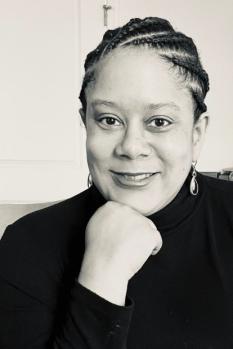 Prof. Kali Murray, professor of law at Marquette University Law School, is the co-director of the school’s Intellectual Property Program, chair of the University Committee on Diversity and Equity, and the faculty adviser to the Black Law Student Association.
Prof. Kali Murray, professor of law at Marquette University Law School, is the co-director of the school’s Intellectual Property Program, chair of the University Committee on Diversity and Equity, and the faculty adviser to the Black Law Student Association.
With a career dedicated to helping others, Murray’s research is focused on the politics of participation in patent, property and administrative law.
Her work looks at a range of issues, including the impact of different administrative actors in patent law; the effect of race, ethnicity and culture on the development of property law; and how administrative law can successfully manage heterogeneous policy environments, address social and political vulnerabilities of citizens, and structure information exchange between administrative actors and the regulated communities.
Murray is the author of “The Politics of Patent Law: Crafting the Participatory Patent Bargain,” part of the Routledge Research Series in Intellectual Property Law.
She has also served as a member on the AALS Faculty Workshop on Pre-Tenured Faculty of Color, chair of the Property Section of the American Association of Law Schools and the Board of Directors for the Association for Law, Society and Property, and is currently serving as an adviser on the Building the Bench.

